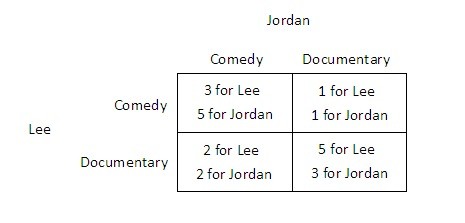Suppose Jordan and Lee are trying to decide what to do on a Friday. Jordan would prefer to see a comedy while Lee would prefer to see a documentary. One documentary and one comedy are showing at the local cinema. The payoffs they receive from seeing the films either together or separately are shown in the payoff matrix below. Both Jordan and Lee know the information contained in the payoff matrix. They purchase their tickets simultaneously, ignorant of the other's choice.  Suppose a timing element is added to the game, and that Jordan buys a ticket first. Then, after seeing Jordan's choice, Lee buys a ticket. What will be the equilibrium outcome?
Suppose a timing element is added to the game, and that Jordan buys a ticket first. Then, after seeing Jordan's choice, Lee buys a ticket. What will be the equilibrium outcome?
A. Both Jordan and Lee will buy a ticket to the documentary.
B. Both Jordan and Lee will buy a ticket to the comedy.
C. Jordan will buy a ticket to the documentary and Lee will buy a ticket to the comedy.
D. Jordan will buy a ticket to the comedy and Lee will buy a ticket to the documentary.
Answer: B
You might also like to view...
Classifying a good as nonrival means
A) that there is a surplus of the good. B) that the good is produced in a competitive market. C) that the producer can prevent people from consuming it. D) that many people can consume the good simultaneously.
When demand is perfectly inelastic, an increase in price will
A) leave total revenue unchanged. B) increase total revenue. C) decrease total revenue. D) either increase total revenue or decrease total revenue, but it is impossible to tell which.